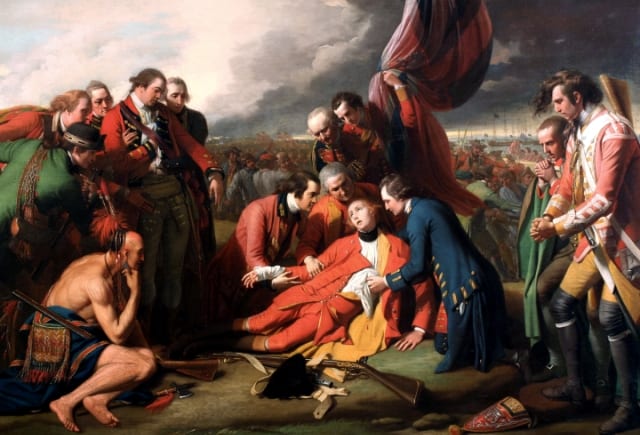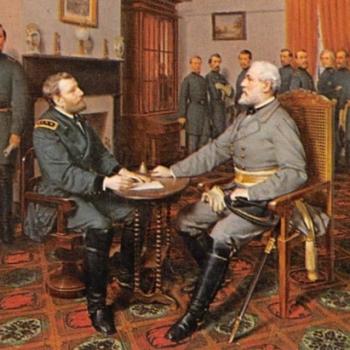
I’m the kind of person who must “meet” people. It is the only way I can know them, living or dead. I must feel their presence on some level, or I cannot hope to truly connect. It cannot merely be a matter of learning about them, but it must be them, something that speak to me of their personhood, the shot through soul of them, in look or or voice or energy of movement, or to run the course of their thinking that ran from the heart, to imagine the accented shape of their words, and the sheer reality of their aliveness.
It is a haunting thing, the quality of humanity that is timeless, that can count out the succession of events, and yet stand outside, or hover above, that succession. Sometimes this barrier of time and space can be broken by the simplest of things, a passage in a book, or a scene in a documentary, or most especially for me, a monument or grave stone, a statue or painting, that for a brief instant brings history to vivid life, often in the very place where this individual made their mark, for good or ill, or perhaps in a mix of ways yet to be fully determined in time. And perhaps it is this realization that our actions today are yet to be determined, and yet to be judged, by future generations that should teach us all an ample sense of empathy and humility.
I must know the people of the past as deeply as I wish to know the people of the present, inside myself, or outside the snare of time, if I am to enter into any relationship at all. And if it comes about, that I should found myself bound, it will be deep and lasting. And every so often I find myself shocked that these persons are no longer among us, and it cannot help but rattle one on the inside and out. It can be in visual, in voice, in story. It can leap out at you from the essence of the written word. Is it mere transference of information, or the breath of ancestors gone out of the mouth into the space that his hallowed for them in this world?
I have always been particularly fascinated in the stories of those who lose wars instead of winning them, of those who are overthrown or underappreciated and outright maligned. I like to try to understand those who seem to have tried their best according to their own understanding of what “the right thing to do” was, who are often scorned in hindsight, though I imagine many of us would have had similar reactions in their shoes. It is why three of my favorite British monarchs are King Henry VI, who was overthrown during the War of the Roses, Queen Mary I, who was nicknamed “Bloody Mary” for the burning of heretics, and King George III, who lost the American Colonies via the American Revolution.
I came to realize that all three of these monarchs might be accurately designated as pious, well-intentioned individuals, no more tyrannical or bloody than many of their contemporaries, but doing what they felt was “right” at the time. This I found to be the case with most historical conflicts, whose positions were usually complicated and challenged the good guy vs. bad guy dynamics winners tend to write into history books. It is also why I became keenly fascinated by the escapades of Bonnie Prince Charlie and the Jacobites, while still seeking to remember the humanity and good intentions of many who served the Hanoverian government. This one fact imprinted itself upon me strongly: There are two sides to every story, and most times neither is completely good, nor completely evil, completely right, nor completely wrong.
When I was in my tweens, before my family owned a computer of our own, I would eagerly visit the local library, and save quarters and dimes in order to pay for Wikipedia print-outs, detailing the biographies of historical figures that fascinated me. Most of them were “red coats”, British soldiers from the Age of Horse and Musket. I would compile who folders of them, and then file them in volumes, and read through them regularly for inspiration in the stories I planned to spin. I would get emotional over the ups and downs of figures long gone, more so than any paperback novels I could read.
I read about General John Burgoyne, the playwright ladies man, beloved by his men for brazen courage and always digging himself a grave through outlandish gambling ventures. I read about General Thomas Gage, the mild-mannered Englishman with an American wife who quite possibly spied on him to aid the rebel cause. I read about Major John Pitcairn, a hard-swearing tough-as-nails Scot, who was renowned for keeping peace between soldiers and locals in Boston, and died gallantly charging Breed’s Hill in the summer heat. Even more keenly, I remember reading through the recollections of Sergent Roger Lamb, a redcoat whose sheer personality burned through the pages of his wartime adventures and daring escapes.
After becoming addicted to the first-hand account, I remember reading The Life and Letters of James Wolfe. It took me months of borrowing and re-borrowing from the library to finish it, and I almost felt that I might weep when I reached the last page. For he had died. He got shot three times and died, the bullets tearing up his body. I knew it was coming all the time…I’ve sung all the old ballads hundreds of times, I knew it was his claim to fame, to be killed on the Plains of Abraham during the battle of Quebec in 1759. But that was before I got to know him. That was before I read all his letters, and he became a real person to me. That was before I read his jokes and complaints and brooding contemplations, even the things that were small-minded and despicable.
And all those things, the good and bad, made him real. And he was young. And he died. Isn’t that still worth crying over, even now? But beyond him, I felt for the multi-faceted characters who shared his story, such as Sergeant James Thompson, fondly called “The Bard of Wolfe’s Army”, who lived to a ripe old age in Canada, recalling his experiences as a Highland soldier during the long war years. I also came to connect to Wolfe’s opponent, the French General Montcalm, an honorable man and pious Catholic, trying to preserve his country’s interests against the odds, and losing his life in the process, leaving behind a wife and large family to mourn him.
I remember visiting King’s Mountain, South Carolina, and the resting place of Major Patrick Ferguson, yet another British officer killed during the American Revolution. To think that those bones lying there once were part of a man, with good and bad attributes, larger than life according to all who knew him, astounded me. I read about Ferguson; I felt, at times, as if I knew him. He was a musician and a poet as well as a soldier; he carried on prolific correspondences through letter. He never allowed obstacles to cow him; a tumor in his leg encouraged him to become a horseman, while paralysis in his arm made him learn to do everything with his left hand. He was also an expert marksman, inventing the Ferguson Rifle for use in the British army.
I gazed at the grave, and the stones piled high behind the headstone. I had been informed of the reason – Ferguson was said to have made a rash challenge on the hill before the battle, that God Almighty could not get him off that mountain. He was like a hero out of ancient Rome, with his fatal flaw: Pride. Ferguson would be shot down on horseback, dressed in his plaid jacket, blowing his silver whistle. To make his own words come back to bite him, his enemies piled rocks on the grave to force him to stay here forever…yes, and even unto judgment day. Then I sang. It was a Scottish lament, in Gaelic, a song from his homeland. I wonder had anything thought to do that in his honor, and the honor of all the others slain here, until now?
I remember my high school days, slogging through text research on the American Civil War, and suddenly finding a connection in the letters of Robert E. Lee, leading up to the outbreak of the war. I found a complex and conflicted man of his times, trying his best to be honorable according to his understanding. Not unlike George Washington in his aristocratic Virginian upbringing and rise to fame through taking up a rebel flag, I could feel the mixed emotions of a man who did not wish the union to be torn apart and who, although he was knee-deep in the slave system, and could be harsh task-master, knew in his heart it was morally wrong in any society. Still, he chose to resign his commission in the US Army rather than raise his hand against his native state.
I found him to very relatable for the very fact that he struggled for a lost cause and tasted defeat and then found a new way forward by accepting the loss of his own cause and preventing further bloodshed by insisting that his fellow Confederates accept fate and go forward to bind the nation together again. When I visited Washington and Lee College, the resting place of Lee who served as the superintendent in his final years. In the chapel where Lee himself often worshiped, there was marble carving of him laid out. I see him as distinctly American figure, as complex as the tapestry of our national story. He was a rebel, yes…but that’s how the American story began, after all. If anything, that makes him more truly part of our warp and weave.
In a more recent experience, I managed to find my way clear to the famous fantasy writer JRR Tolkien, who I had not “met” in a way beyond Middle Earth, and the fandom it spawned. But in this case the personal “meeting” happened swiftly, through some passing of scenes of watching an interview he gave on camera. Watching him alive, I wished to God he were not dead, and that we might share space together. And quite out of nowhere, I found yourself overcome with a realization of the humanity of this figure, who had dwelt just below the surface of my subconscious through his tales, and it made me very nearly cry. It is almost as if out of the not-so-very distant past someone with that very same voice has said, “Young lady, you Americans…always catching onto things so quickly…you should take more time to understand…perhaps in Oxford, yes?”
I think Tolkien would have approved, in that he had a very keen sense of the relevance of history, and the fact that some things stretch into a realm that is “more than memory”. The reason for this connection, this living reality between characters living and dead, is that history is more than simply facts. It is soul, and story, and some universal truths carried beneath the bare layers of flesh and bone. You can never completely de-mythologize history anymore than you can fully de-spiritualize mankind. We must believe that our stories are worth telling, for all the bitter glory and blazing shame. We have to believe that our legacies will last, on some transcendent plane, even if they are forgotten on this one.
For those who believe in the workings of Providence and the beauty of mystery and the everlasting nature of the soul, historical studies are a unique opportunity to grow in spiritual awareness and connect with those who have gone before us. As an old Celtic prayer for the departed reads: “May God bless all the company of souls here. May God and Mary bless you. You too were here as we are now, and we hope to join you soon. May we all be adorned in the bright King of Heaven.”












